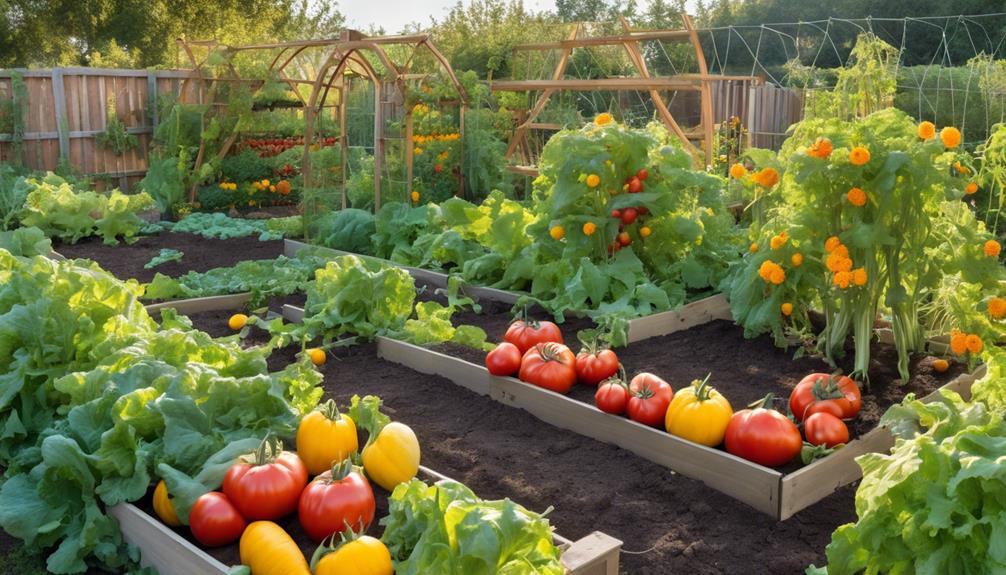
What Are the Best Low-Maintenance Garden Plants?
2 October 2024
Top Spring Garden Maintenance Tasks to Prioritize
2 October 2024Soil health is vital for the success of your garden, as it directly affects nutrient availability, moisture retention, and plant resilience.
Healthy soil provides essential minerals and promotes beneficial microorganisms, which enhance plant growth and vitality. Well-structured soil facilitates air and water movement, encouraging deeper root systems for improved nutrient uptake.
Additionally, maintaining an optimal soil pH supports microbial activity, ensuring that plants receive nutrients efficiently.
By understanding and improving soil health, gardeners can create thriving environments that are better equipped to resist pests and diseases.
Exploring effective practices for enhancing soil health can significantly contribute to the longevity and productivity of your garden.
Importance of Nutrient-Rich Soil
Nutrient-rich soil is vital for fostering ideal plant growth, as it provides the necessary minerals and elements that support healthy development.
Moreover, such soil enhances water retention, allowing plants to access moisture more effectively and reducing the need for frequent irrigation.
Understanding the significance of nutrient-rich soil is essential for any gardener aiming to cultivate a thriving garden.
Enhances Plant Growth
The importance of a garden hinges greatly on the quality of its soil, as it serves as the foundation for robust plant growth. Nutrient-rich soil provides crucial macro and micronutrients, such as nitrogen, phosphorus, and potassium, which are critical for cellular processes, photosynthesis, and overall plant vigour.
The availability of organic matter improves soil structure, promoting root development and facilitating nutrient uptake. Additionally, healthy soil teems with beneficial microorganisms that foster symbiotic relationships with plant roots, further enhancing nutrient absorption and resilience against diseases.
Improves Water Retention
A well-balanced soil composition significantly enhances water retention capabilities, which is vital for sustaining plant health.
Nutrient-rich soil, characterised by an ideal mix of sand, silt, and clay, improves the soil's structure and porosity. This composition allows for the effective infiltration and retention of moisture, reducing the frequency of irrigation and minimising water loss through evaporation.
Organic matter, such as compost, further increases water-holding capacity, providing a reservoir for plants during dry spells.
By fostering a robust soil ecosystem that includes beneficial microorganisms, we promote the formation of aggregates that facilitate aeration and water distribution.
Ultimately, improved water retention not only supports plant health but also contributes to water conservation efforts, making it a significant aspect of sustainable gardening practices.
Soil Ph and Microbial Activity
Soil pH plays a vital role in determining the availability of nutrients and the general health of microbial communities.
By understanding the relationship between organic matter content, soil structure, and aeration, gardeners can enhance microbial activity, leading to improved soil health.
Furthermore, implementing effective soil moisture retention techniques further supports a thriving ecosystem that benefits plant growth.
Organic Matter Content
Understanding organic matter content is crucial for optimising garden health, as it significantly influences soil pH and microbial activity. High levels of organic matter enhance nutrient availability and support a thriving ecosystem of soil microorganisms, which are vital for plant growth.
Conversely, low organic matter can result in imbalanced pH levels that impede nutrient absorption.
Consider the benefits of enriched organic matter:
- Improved nutrient retention, ensuring plants receive essential minerals.
- Enhanced soil structure, promoting better root penetration.
- Increased microbial diversity, fostering resilience against pests and diseases.
- Optimal moisture retention, minimising irrigation needs.
Mastering organic matter management is fundamental for cultivating a vibrant, productive garden.
Soil Structure and Aeration
Good soil structure and adequate aeration play significant roles in maintaining a healthy garden ecosystem.
Well-structured soil facilitates the movement of air and water, which is fundamental for root development and microbial activity. When soil particles are appropriately arranged, they create spaces that promote oxygen diffusion and nutrient availability, enhancing plant health.
Consider the following aspects of soil structure and aeration:
- Loamy texture that balances sand, silt, and clay for optimal drainage.
- Aggregates that enable water retention while preventing compaction.
- Earthworm tunnels that enhance airflow and nutrient cycling.
- Microbial networks that thrive in well-aerated environments, supporting soil health.
Mastering soil structure and aeration ultimately leads to a flourishing garden ecosystem.
Soil Moisture Retention Techniques
Maintaining adequate moisture levels in the garden is crucial for plant health and overall productivity. Effective soil moisture retention techniques not only improve water availability but also promote a thriving microbial ecosystem.
Implementing these strategies ensures that plants receive consistent hydration while optimising nutrient absorption.
- Organic mulching: a protective layer that reduces evaporation and suppresses weeds.
- Soil amendment with compost: improves soil structure, increasing its water-holding capacity.
- Deep-rooted cover crops: penetrate subsoil, bringing moisture to the surface.
- Drip irrigation systems: deliver water directly to the root zone, minimising waste.
Soil Testing Methods
Understanding soil testing methods is crucial for optimising garden health and productivity.
By identifying your soil type, you can tailor crop rotation strategies and apply compost tea effectively.
These practices not only improve soil quality but also support sustainable gardening efforts.
Identify Your Soil Type
Identifying your soil type is an essential step in cultivating a thriving garden, as it directly influences plant health and growth.
Soil testing methods can provide important insights into your garden's foundation. Understanding your soil's composition enables you to tailor your gardening approach effectively.
Consider the following characteristics to identify your soil type:
- Texture: Is it sandy, silt, or clay? This influences drainage and nutrient retention.
- Colour: Dark soils often indicate rich organic content, while lighter soils may suggest lower fertility.
- pH Levels: This determines the acidity or alkalinity, impacting nutrient availability.
- Organic Matter: The presence of decomposed materials fosters microbial activity and improves soil fertility.
Mastering soil identification empowers you to optimise your garden's potential.
Crop Rotation Strategies
Implementing effective crop rotation strategies greatly enhances soil health and productivity after determining your soil type.
By diversifying plant families in successive growing seasons, you can mitigate pest and disease pressure while improving nutrient cycling.
Consider these key strategies for successful crop rotation:
- Legume Integration: Incorporate nitrogen-fixing legumes to enrich soil fertility naturally.
- Diverse Plant Families: Rotate between distinct plant families to disrupt pest life cycles and promote biodiversity.
- Cover Cropping: Utilise cover crops during off-seasons to prevent erosion and improve soil structure.
- Seasonal Planning: Align crops with seasonal conditions to optimise growth and minimise stress.
These practices not only enrich the soil but also foster a resilient gardening ecosystem that thrives over time.
Compost Tea Application Techniques
A well-crafted compost tea can significantly improve soil health and plant vigour when applied correctly.
Mastering the application techniques enhances the effectiveness of this organic solution. Here are some key methods to ensure ideal results:
- Foliar Spraying: A fine-mist application allows nutrients to be absorbed directly through the leaves.
- Soil Drench: Pouring compost tea directly onto the soil effectively nourishes root systems.
- Drip Irrigation: Integrating compost tea into irrigation systems provides a steady supply of nutrients.
- Timing: Applying during early morning or late afternoon minimises evaporation and enhances absorption.
Increased Plant Resilience
Healthy soil plays a crucial role in improving plant resilience, enabling gardens to thrive even in challenging conditions. Well-structured soil, rich in organic matter and beneficial microorganisms, fosters deep root systems that enhance water and nutrient uptake. This resilience allows plants to withstand environmental stressors such as drought, pests, and diseases.
| Soil Component | Role in Resilience | Impact on Plants |
|---|---|---|
| Organic Matter | Increases nutrient availability | Supports vigorous growth |
| Microbial Diversity | Promotes disease resistance | Improves overall health |
| Soil Structure | Enhances aeration and drainage | Strengthens root systems |
Soil Amendment Techniques
Effective soil amendment techniques play an essential role in enhancing garden health and productivity.
Utilising worm castings enriches the soil with important nutrients, while biochar improves soil structure and water retention.
Furthermore, mulching serves as an effective method for maintaining moisture levels, consequently supporting plant growth.
Worm Castings for Soil Enrichment
Worm castings, often referred to as "black gold" by gardeners, serve as a powerful soil amendment that greatly improves soil health and fertility.
Rich in crucial nutrients and beneficial microorganisms, these organic fertilisers elevate the soil structure, promoting aeration and water retention.
Incorporating worm castings into your garden can yield remarkable benefits, including:
- Increased nutrient availability, ensuring plants receive critical minerals.
- Boosted microbial activity, fostering a thriving ecosystem within the soil.
- Improved moisture retention, reducing the need for frequent watering.
- Natural pest deterrence, promoting healthier plant growth without synthetic chemicals.
Utilising worm castings not only enriches your soil but also aligns with sustainable gardening practices, making it an indispensable tool for any dedicated gardener.
Biochar for Soil Enhancement
In the realm of soil enhancement, biochar emerges as a transformative amendment that significantly elevates soil health and fertility. This carbon-rich material, produced through the pyrolysis of organic matter, improves various soil properties, making it an invaluable tool for gardeners seeking mastery in soil management.
- Increased soil aeration, allowing roots to breathe and absorb nutrients efficiently.
- Improved water retention, ensuring plants have access to moisture during dry spells.
- Enhanced microbial activity, fostering a vibrant ecosystem that promotes plant growth.
- Reduction of soil acidity, creating a more favourable environment for diverse crops.
Incorporating biochar into your garden not only supports sustainable practices but also empowers you to cultivate thriving plants in harmony with nature.
Mulching for Moisture Retention
Mulching serves as a crucial technique for improving moisture retention in garden soils, offering numerous benefits that contribute to overall soil health. By creating a protective layer on the soil surface, mulch minimises evaporation and regulates temperature fluctuations, fostering an environment conducive to plant growth.
- Organic materials such as straw or wood chips decompose, enriching the soil with essential nutrients.
- Aesthetic appeal enhances the garden's visual charm while suppressing weeds.
- Improved biodiversity promotes beneficial microbial activity, supporting a healthier ecosystem.
- Soil structure improvement leads to better aeration and infiltration, allowing roots to thrive.
Incorporating mulching as a regular practice fortifies your garden, ensuring ideal moisture levels and robust plant development.
Soil Erosion and Remediation
Soil erosion poses a significant threat to garden health, necessitating effective remediation strategies.
Utilising cover crops can serve both as a protective measure against erosion and as a means for nutrient cycling, enhancing soil fertility.
Furthermore, implementing natural barriers can further safeguard soil integrity, promoting a sustainable gardening environment.
Cover Crops for Soil Protection
Cover crops serve as a fundamental tool in the fight against soil erosion and degradation, providing numerous benefits for garden health.
By establishing a protective canopy, these crops prevent soil displacement and improve soil structure. Their extensive root systems bind the soil, reducing runoff and promoting water infiltration.
- Grass cover crops stabilise soil with dense root networks.
- Leguminous cover crops boost soil moisture retention and improve aeration.
- Mulching cover crops shield the soil from harsh weather elements.
- Deep-rooted species break up compacted layers, improving drainage.
The strategic use of cover crops not only protects the soil but also fosters a resilient garden ecosystem, ensuring long-term productivity and sustainability.
Cover Crops for Nutrient Cycling
The integration of cover crops into garden management practices significantly enhances nutrient cycling, thereby promoting healthier soils.
These crops serve as a natural mechanism for restoring fertility, improving soil structure, and minimising erosion. Through their growth, cover crops capture excess nutrients, preventing leaching and making them available for subsequent crops.
Benefits of cover crops include:
- Nitrogen fixation: Leguminous cover crops enrich the soil with this essential nutrient.
- Organic matter supplement: Decaying biomass enhances soil microbial activity and structure.
- Soil moisture retention: Roots improve infiltration, reducing irrigation requirements.
- Weed suppression: Dense foliage hinders competitive weeds from establishing.
Natural Barriers for Soil Protection
In conjunction with implementing cover crops, utilising natural barriers is an effective strategy for protecting soil from erosion and enhancing its overall health.
Natural barriers, such as hedgerows, stone walls, and terraces, play a crucial role in stabilising the soil structure and minimising runoff. These elements serve not only as physical shields but also promote biodiversity and improve the ecological balance within your garden.
- Hedgerows: Dense plantings that act as windbreaks, reducing soil displacement.
- Terraces: Flat areas on slopes that slow water movement, promoting infiltration.
- Stone Walls: Natural formations that prevent soil loss while fostering habitat diversity.
- Grassy Buffers: Strips of vegetation that intercept runoff, filtering pollutants.
Investing in these barriers is essential for sustainable soil management.
Why Choose TKL Birmingham Gardener
Choosing TKL Birmingham Gardener ensures that your garden receives expert care tailored to its unique needs. Our team of knowledgeable professionals possesses a deep understanding of soil health principles, guaranteeing that every gardening decision is grounded in scientific expertise.
We assess your garden's specific soil conditions and employ targeted strategies to enhance fertility, structure, and biodiversity. Our commitment to sustainable practices means we utilise organic amendments and innovative techniques that promote long-term soil health.
Common Soil Myths Debunked
Many gardeners hold misconceptions about soil that can hinder their gardening success. One prevalent myth is that all soil is created equal; in reality, soil types vary considerably in texture, nutrient content, and pH, impacting plant health.
Another misconception is that adding more fertiliser guarantees better growth; however, excessive nutrients can lead to toxicity and imbalance.
Furthermore, many believe that soil health is solely determined by its appearance, neglecting the importance of microbial activity and organic matter.
Some gardeners assume that tilling is always beneficial, yet it can disrupt soil structure and harm beneficial organisms.
Discarding these myths is crucial for fostering a deeper understanding of soil dynamics, ultimately enhancing garden productivity and sustainability.
Soil Health Maintenance Strategies
Understanding the truths about soil is the initial step towards effective gardening. To maintain soil health, several strategies can be employed, ensuring your garden thrives and flourishes.
- Regular composting: Enriching soil with organic matter improves microbial activity.
- Crop rotation: Diversifying plant species prevents nutrient depletion and pest build-up.
- Mulching: Applying organic mulch retains moisture and suppresses weeds while adding nutrients as it decomposes.
- Soil testing: Periodic assessments reveal pH levels and nutrient deficiencies, allowing for targeted amendments.




